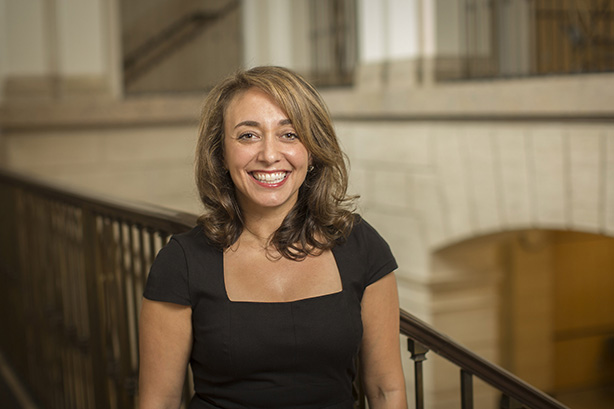End Note
Cornell: A school of questions

Sharon L. Poczter '01 is assistant professor of managerial economics in the Charles H. Dyson School of Applied Economics and Management and the Cornell College of Business.
It all started with a question. Or, that is, a list of questions. I remember very vividly sitting in the Warren Hall office of my economics professor with a list of maybe 30 questions challenging the assumptions of a model that economists have accepted for over 75 years.
I had the courage of a newly forming academic mind that had yet to be confined by the realities of research. I questioned everything. And I remember my exhausted junior professor's response after being inundated by so many questions – and patiently answering each one – was a very calm, empathetic: "People like you, Sharon, with so many questions about the world, go to graduate school." And thus the seed was planted for my journey from Cornell and back.
Granted, my intellectual inquiry did not start at Cornell and was not always based on economics. I was the nerdy child who asked my parents for a chalkboard for my birthday to teach an imaginary class with, and a chemistry set to formalize the experiments I had already been carrying out in the basement using household supplies. But the questions that remained the most salient to me were always based on economics and policy.
I even remember my first economics-related question. As a child on a family trip to a then still-very-much-developing Jamaica, I asked my father why two or three people at the airport simply looked at our passports on the way through security, seemingly not adding value to the process. His response – that governments of countries without well-developed labor markets sometimes need to employ low-skilled labor in non-output generating jobs to increase employment – simply shook my 8-year-old intellect. I was officially hooked on economics. From then on the concept of how institutional development impacts economic growth would be the guiding light of my academic journey. Today, my research still echoes that trip, examining how the lack of financial development stymies the growth of firms in developing countries and governments' policy responses to counteract this effect.
I started my Cornell education as pre-med with the notion of helping others; I soon switched to economics, though, specifically to the department that would become the Dyson School of Applied Economics and Management. And there, coupled with the encouragement of my professors to continue questioning, I realized that being a scholar and educator can also change lives – as my life was indelibly changed by several professors.
I learned that I could take my passion, and my questioning spirit, on to graduate school – that I could learn for life, and I could inspire others by being a professor just as I was being inspired at Cornell.
That is why upon receiving a job offer from Cornell in my last year as a doctorate student at the University of California, Berkeley, I had an overwhelming sense of continuity and tradition well up inside of me. The place where I was first encouraged to keep questioning, and the place where I first imagined becoming a professor, was welcoming me back with open arms. I was coming home.
Cornell is a place of questions. We aim to be different by pushing our students to be critical, to have the courage to question underlying assumptions about how models, theories and society work. This is the very fabric of who we are, or as Carl Becker, famed Cornell professor and historian, phrased the faculty's commitment to academic freedom and creativity: Cornell is about "thinking otherwise."
This is the feeling I take with me each time I step into the classroom, each time I have the privilege of inspiring my students. That is why, each year, even as a junior professor, when students in my office hours come in with a lengthy list of questions, challenging established frameworks and theories, I simply sit back, smile and answer intently.
Sharon L. Poczter '01 is assistant professor of managerial economics in the Charles H. Dyson School of Applied Economics and Management and the Cornell College of Business.